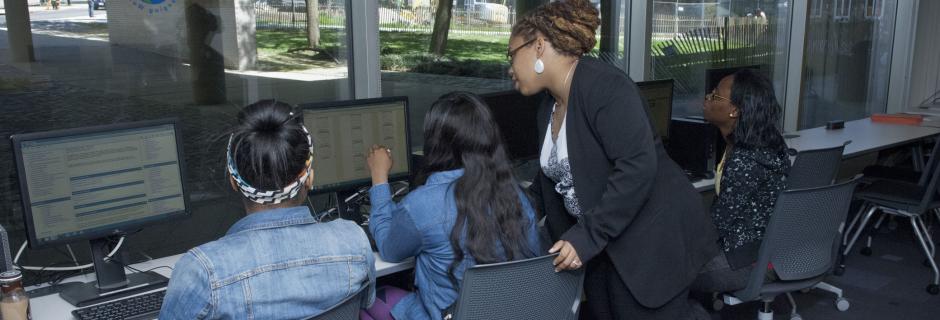Faculty Support

Faculty are often the first to notice when a student needs support. We encourage direct conversations, but for more serious concerns, a well-informed referral is key. Even if a student isn’t ready for help, your referral can plant the seed. Counseling is most effective when students feel supported—not pushed.
After referring, you're welcome to follow up with the counselor to coordinate support. While personal details remain confidential, your role in a student’s success is vital—and we’re here to partner with you. View our Faculty Welcome Video to learn more.
What Is Counseling?
Counseling supports student growth and self-direction through respectful, trusting relationships. By exploring their experiences, students gain clarity to make meaningful decisions.
Counselors also partner with faculty through class visits, consultations, and Student Success Workshops to promote student development and success.
Counseling Center Services to Support Student Success
Faculty play a key role in identifying students who may benefit from additional guidance. The Counseling Center provides:
-
Academic Support: Educational planning for students on academic probation, success strategies, time/academic amnesty, and major exploration
-
Career Guidance: Career assessments, exploration tools, and planning resources
-
Transfer Planning: Information on dual admissions, college selection, and application support
-
Personal Development: Support with stress management, decision-making, life balance, and referrals to community resources
-
Course Withdrawals: Guidance on dropping courses and understanding academic impact
-
Instructor-Student Concerns: Assistance navigating classroom-related challenges
-
Crisis Response: Immediate support for students in distress (for on-campus emergencies, call Security at ext. 811)
Our goal is to partner with you in promoting student development, well-being, and academic achievement.
For immediate assistance, text or call 988 (national hotline) or 215-685-6440, crisis line.
Additional Student Mental Health Resources.
Confidentiality
Students should understand that both counseling and higher education laws prevent the Counseling Department from sharing counseling records without written permission from the student. There are a few exceptions to confidentiality, and it is important that you understand them. Counselors may have to turn over records for a court order or subpoena. Counselors are also legally-mandated reporters of abuse or suspected abuse of a child, elder, or disabled person, as well as threats made to your life or the life of another. Confidentiality may be waived if disclosure is necessary to protect the safety of the student or others.
If a student demonstrates behavior indicating they may be a danger to themselves or others—including students, staff, or faculty—please contact our Security Office immediately at ext. 8111. Emergency services (911) and the Counseling Department will be notified if security determines intervention is necessary.
When to Refer Students to Counseling Services
-
Frequent lateness or absences
-
Withdrawn or inhibited behavior
-
Inconsistent classroom vs. test performance (possible anxiety or learning difficulties)
-
Excessive demands for meetings or attention
-
Expresses stress, trouble, or external concerns (e.g., money, family, relationships)
-
Signs of substance use
-
At risk of academic failure (on probation or verge of being dropped)
-
Shows difficulty balancing work, school, and family
-
Inappropriate behavior (outbursts, crying, and excessive hostility)
-
Career indecision or needs transfer information and help planning their future
How to Refer Students
If you want to refer a student, meet with them privately to discuss the benefits of counseling. If the student is open to support, referrals can be made in person, by phone, email ( '; // --> ), or through Starfish.
Use Starfish for personal or emotional concerns, but do not use it for urgent safety issues. In a crisis, immediate help is needed, as referrals are checked daily—not in real time.
For immediate assistance, text or call 988 (national hotline) or 215-685-6440, crisis line.
Additional Student Mental Health Resources.
- Direct the student to the Counseling Center (Bonnell BG-07 or NERC 102) to schedule an appointment. Students can request a specific counselor or be assigned one. Current students may also schedule through Starfish.
- If the student is open to counseling but hesitant, offer to help schedule the appointment during your meeting. You can also submit a Counseling Referral through Starfish Connect, which prompts the department to follow up.
- For brief concerns or urgent needs, counselors are available on a drop-in basis. Drop-ins are first come, first served and typically last 15 minutes. More time is given for students in crisis.
Note: Hours vary by location and during summer sessions.
Virtual Drop-In Services at Main Campus
Counseling hours vary at the Regional Centers and during Summer Sessions.
Referral Best Practices
- If you'd like to discuss a referral before speaking with a student, call us directly. If unsure who to contact, reach out to the Counseling Department Head at ext. 8167. You may join a meeting with the student and counselor if appropriate.
- If a student declines help, respect their decision—counseling is most effective when the student is ready.
- After a referral, you can follow up with the counselor to explore how you can support the student. Personal details shared in counseling remain confidential.
STATEMENT ON DISRUPTIVE BEHAVIOR
Faculty have the right to hold students to standards of behavior that are conducive to a positive learning environment. It is hoped that situations may be mediated by a counselor, division chair or other appropriate college staff. Mediation can often resolve behavioral problems before disciplinary action is warranted. However, when mediation is inappropriate, or does not work, the student should be referred to the Office of the Dean of Student Life in S1-10, Ext. 8161. The Code of Conduct and other appropriate College policies and procedures including Student Rights and Responsibilities are outlined in the Student Handbook. Faculty should use the Behavioral Reporting Form to indicate when student incidents involve behavior mentioned in the Student Code of Conduct.
